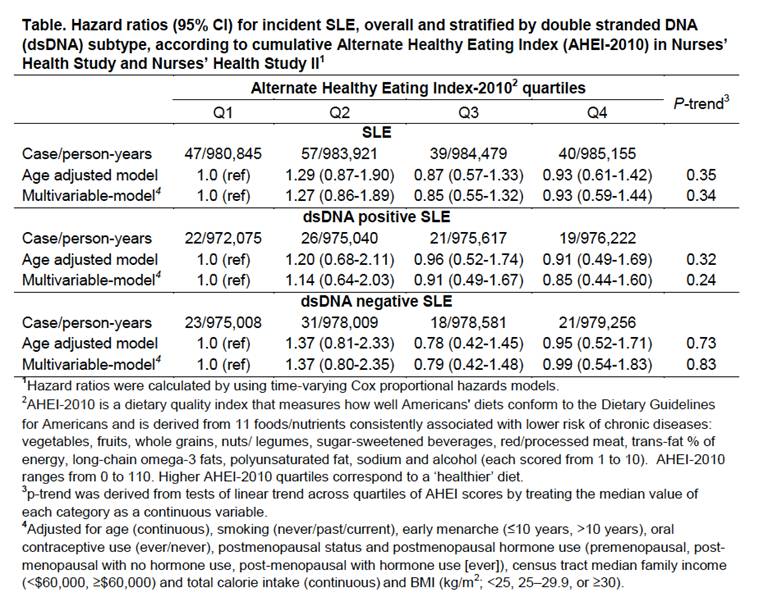Session Information
Date: Tuesday, November 7, 2017
Title: Epidemiology and Public Health Poster III: Rheumatic Disease Risk and Outcomes
Session Type: ACR Poster Session C
Session Time: 9:00AM-11:00AM
Background/Purpose: Prior studies suggest that high intake of antioxidants, fish, olive oil, and nuts may decrease risk of chronic inflammatory diseases and reduce inflammatory biomarkers. Current knowledge remains scarce regarding a potential association of dietary factors and incident SLE. We aimed to prospectively evaluate the association between the Alternate Healthy Eating Index 2010 (AHEI-2010), a dietary quality index that measures how well Americans’ diets conform to the Dietary Guidelines for Americans, and risk of incident SLE and its subtypes of dsDNA positive (+) versus negative (-) SLE.
Methods: We included 79,939 female nurses in NHS (1984-2012) and 93,554 in NHSII (1991-2013). Lifestyle, environmental, and medical data were collected through biennial questionnaires. Dietary data were obtained from validated food frequency questionnaires at baseline and approximately every 4 years during follow-up. Incident SLE was confirmed by medical record review. Time-varying Cox regression models estimated pooled hazard ratios (HRs [95% confidence intervals]) of SLE risk, overall and by dsDNA subtype, in association with cumulative average AHEI-2010 (in quartiles, with higher AHEI-2010 quartiles corresponding to a ‘healthier’ diet) through the 2-year cycle prior to diagnosis, controlling for potential confounders. Individual AHEI-2010 components and SLE risk were assessed separately.
Results: We identified 183 SLE cases (88 dsDNA+ and 95 dsDNA-) during nearly 20 years of follow-up from 1984 to 2013 in NHS/NHSII. In multivariable-adjusted models, we found that greater adherence to the highest, or ‘healthiest’ quartile of AHEI-2010 (vs. lowest quartile, reference) was not associated with SLE risk overall (HR 0.93 [95% CI 0.59-1.44]) or after stratification by dsDNA+ (HR 0.85 [95% CI 0.44-1.60]) or dsDNA- (HR 0.99 [95% CI 0.54-1.83]) subtypes (Table). However, women in the highest quartile of nut/legume intake had a decreased risk of developing SLE (HR 0.77 [95% CI 0.62-0.97], p-trend 0.02) compared to women in the lowest quartile. No association was demonstrated with other individual AHEI-2010 components and SLE risk.
Conclusion: Healthy diet as quantified by the AHEI-2010 was not associated with SLE risk overall or by dsDNA subtype among women. We did however observe a potential 23% reduction in overall SLE risk with high nut/legume intake, known to be a rich source of anti-inflammatory polyunsaturated fats. This finding suggesting a link between a dietary component and SLE risk is hypothesis generating and warrants further investigation.
To cite this abstract in AMA style:
Barbhaiya M, Lu B, Tedeschi SK, Malspeis S, Sparks JA, Willett WC, Karlson E, Costenbader KH. Dietary Quality and Risk of SLE in the Nurses’ Health Studies [abstract]. Arthritis Rheumatol. 2017; 69 (suppl 10). https://acrabstracts.org/abstract/dietary-quality-and-risk-of-sle-in-the-nurses-health-studies/. Accessed .« Back to 2017 ACR/ARHP Annual Meeting
ACR Meeting Abstracts - https://acrabstracts.org/abstract/dietary-quality-and-risk-of-sle-in-the-nurses-health-studies/

